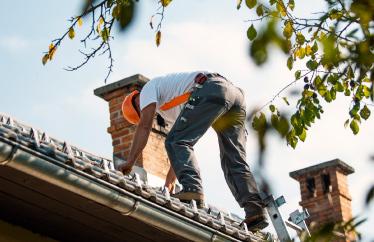Our homes are more than just where we live — they are often our most valuable investment. So when it’s time to renovate your home, it’s important to take steps to protect your most precious asset. After all, you don’t want to end up hiring an unskilled contractor who doesn’t pay enough attention to details. Or even worse, hire someone running a home repair scam.
What are some of the risks of hiring the wrong contractor?
There are several reasons why choosing the wrong contractor could be a costly mistake.
- A contractor who uses poor quality materials or does poor quality work can damage your property and potentially lower the value of your home. Homeowners insurance usually doesn’t cover issues caused by shoddy workmanship.
- If a contractor doesn’t get the right building permits or schedule inspections, homeowners can end up paying penalties or being forced to rip out certain improvements. Insurance companies can deny claims related to unpermitted renovation projects.
- Contractors who do not carry workers’ compensation for their employees expose homeowners to financial risk, especially if someone is injured while working on a home.
- If your contractor fails to pay someone working on your home improvement project, a subcontractor may be able to have a lien placed on your home and force you (the property owner) to pay up.
When should you hire a general contractor?
Generally, if a home renovation project will take longer than a week to complete and requires the expertise of multiple construction specialists, you should consider hiring a general contractor. We saw in our 2023 Homeowner Preparedness Report that 54% of surveyed homeowners would hire a professional if they didn’t have the skills necessary for the job.
Your general contractor will manage the schedule and budget for your project, pull permits and handle inspections. He or she may do some of the work or none of it at all, depending on the scope of your project and their skill set.
General contractors are responsible for bringing in qualified subcontractors to work on plumbing, roofing and other aspects of renovation projects. They must also ensure that all subcontractors are licensed and insured.
Preparing for your project to begin
Homeowners planning to renovate their homes need to have a plan in place before any work begins. Are you removing walls or adding new sections to your home? Are you making any changes to roofing or flooring? If your project involves moving washers or dryers, plumbing and electrical work will likely be needed. If you’re adding a room, you may need help from subcontractors who specialize in framing, electrical, drywall and foundation work.
Consider writing a detailed summary of the project and your expectations. Later in the process, you can share this plan with different contractors. That way, they can bid from the same list of details and you can hire the person who seems capable of doing the best job for the best rate.
Calling your local building department is another good step to take before you start renovating your home. It’s often a city office, but it could be a county department. Find out whether you’ll need a permit for your project. Having this information in advance can be helpful when interviewing and evaluating contractors.
If you live in an area that experiences severe weather during the winter, the warmer months may be a busy time for contractors and local permitting authorities. That’s something to keep that in mind as you create the timeline for your home improvement project.
If you live in a neighborhood that has a homeowners association (HOA), there may be architectural guidelines that you have to comply with. Some HOAs have an architectural review board that has to approve home renovations.
Check your homeowners insurance policy to see if you have personal liability coverage. If you don’t, consider adding it to your policy to ensure you’re protected if any workers get hurt.
Finding qualified contractors
The best way to find a reputable contractor is through a referral. Check with co-workers, church members and neighbors. Poll your friends on social media or check online communities like NextDoor where residents in your area may be exchanging information about local services.
If you know a plumber or an electrician, ask for recommendations. There’s a good chance they know several contractors who may be willing to work on your project. Ask the realtor who helped you find your home for references. Your city planning and building inspection departments may be able to connect you with contractors as well.
As you start creating a list of possible contractors, check the Better Business Bureau. Read reviews and look for a pattern of complaints or unresolved cases. Be leery of any excessively strong opinions.
Interviewing contractors
Don’t hire a contractor without meeting with potential candidates and discussing details about your project. Interviewing contractors is the best way to get a feel for how they do business. Aim to end up with at least three bids.
As you speak with prospective contractors, you’ll want to ask them a series of questions:
- Can they provide proof that they’re licensed and insured in your state?
- How long have they been in business?
- Does their experience match the scope of your project?
- Will they be handling any of the work themselves?
- Which aspects of your project will be handled by subcontractors?
- Will they need permits? (If they ask you to get permits, that’s a red flag.)
- When can they start and how long will the project take to complete?
- Will they be able to provide an itemized bid for your project and how soon can they provide it?
- Do they have an office address?
- What forms of payment will they accept? (If they only accept cash, that’s a red flag.)
- Can they provide references from at least three former customers?
Once you’ve had conversations with different contractors, request itemized bids from the ones you’re interested in working with. Provide each potential contractor with enough details about your project so that they can produce a bid for every aspect of it, including the cost of building materials, demolition and disposal.
Evaluating bids and negotiating
Once you’ve received a bid from a contractor, keep in mind that it’s OK to negotiate. Contractor demand can be quite high in some regions of the country and during the spring and summer seasons. Contractors may be less willing to negotiate if many homebuyers and homeowners need their services. But sometimes it pays to try and talk someone into offering a better deal.
Be prepared to pay a small deposit. With most projects, you may need to make as much as a 10% deposit. Just make sure you find out whether your state limits the amount you’re required to pay contractors up front.
If you’re on a budget, ask for a reduction in the overall cost of the project. When it’s all said and done, a contractor can charge up to 20% of the total cost of the home renovation. Or ask whether you can make a large payment when the project has been completed to ensure that you’re satisfied with the job.
Choosing your contractor
After you’ve reviewed bids, checked online reviews and verified licenses and insurance, you should be ready to pick a general contractor. But if you have any last-minute reservations (or need a tie breaker), visit the National Association of Home Builders website. You’ll find information that will help you choose the right contractor, including warning signs to look out for.
Cost should be an important consideration. But try to make a decision based on other factors as well, such as experience.
Get it in writing
Once you and your contractor have agreed on prices and the plan for carrying out your project, be sure to get a contract that describes the work that needs to be done and the payment schedule. This will help you avoid confusion and disagreements.
Some of the items to list in a contract include:
- Start and completion dates
- Line items detailing the cost of each part of the project
- Deadlines for the initial deposit, incremental payments and final payment
- A lien waiver clause that protects you from being held liable if subcontractors aren’t paid
There’s a saying that things never turn out according to plan. If changes need to be made, update the contract and make sure both you and your contractor sign the new agreement. That’s the best way to keep everyone on the same page and stay on track toward completing your project. Good luck!
Have questions about how a renovation project may impact your homeowners insurance policy, or just need more help with a current home renovation? Speak with a Hippo specialist today to learn more.




